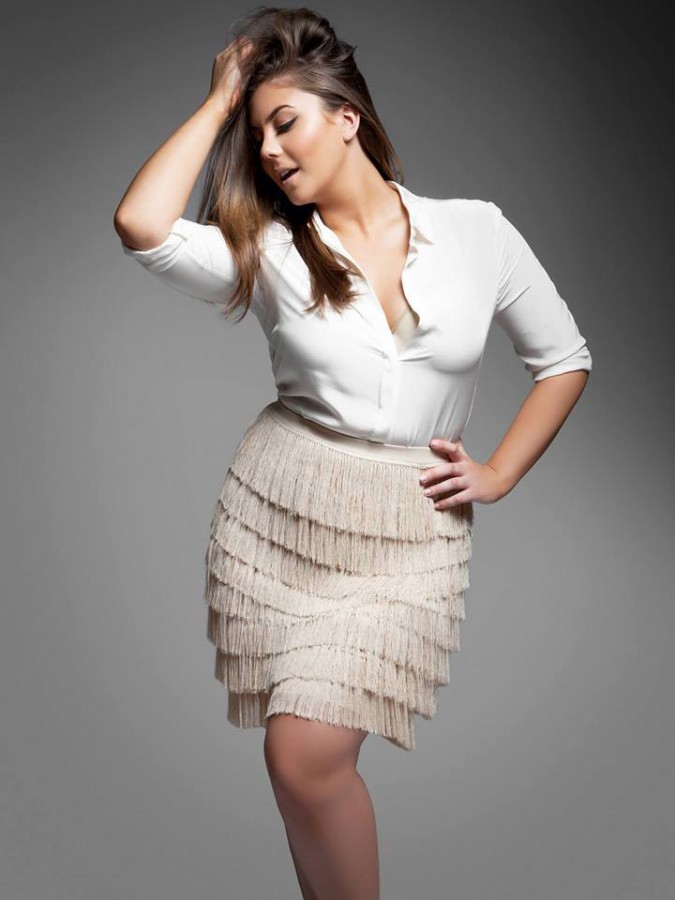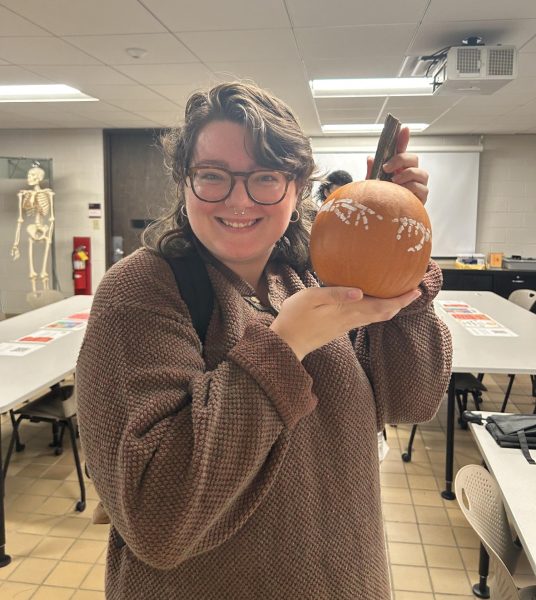Being body positive in Buffalo
Caralyn Mirand has recently opened her own image consultation company to help people feel comfortable and confident about their bodies.
November 19, 2015
“It means a lot to me when a girl comes up and says, ‘You inspired me to love myself.’ People have done all types of crazy stuff like that to me,” said Cat McCarthy, a member of the burlesque group, The Stripteasers, who perform each Tuesday night in Allentown. “Once when performing in costume, I had a hot girl walk up to me at the Old Pink Bar in Buffalo, rip my mustache off of my face, kiss me hard, stick the mustache back on, put her number in my hand and disappear into the bar before I had a chance to blink.”
McCarthy, who is a graduate of the University of Buffalo with a Bachelor’s of Fine Arts in painting, was not always confident about her weight.
“I honestly thought, ‘I’m too fat to be on stage,’” McCarthy said. “When I met [The Stripteasers] they encouraged me to flaunt my beauty. They told me I had to be a Stripteaser.
“It changed my life – not being afraid. You have to stop listening to society’s bullshit as to what is beautiful. Everybody should be allowed to feel comfortable in their skin and celebrate their loveliness. No one should feel ashamed because they are not a size two. Size two and size twenty-two are the same. We are all beautiful.”
But, in the “Fast Food Nation” where “ketchup flows like wine” and shoestring fries accompany endless burgers, overweight and obese people have been blamed for rising healthcare costs.
“In Western New York there are enough adults whose body mass index categorizes them as overweight or obese to fill Ralph Wilson Stadium about 10 times,” said Dr. Richard Vienne, Univera Healthcare’s vice president. “Medical spending in the Western New York attributable to overweight and obesity health effects is estimated at $808 million.”
Reddit, the entertainment, social networking, and news website, recently banned five forums, one which was titled, “Fat People Hate (FPH).” FPH had reached over 151,000 subscribers before it was banned. “We’re banning behavior, not ideas,” a Reddit spokesperson said.
Among the other forums banned were “r/transf*gs, r/neof*g, and r/shitni***rssay.” The implicit hatred in the titles of these forums suggests increasing tensions if politicians, educators, and the population do not begin to address the issue weight issues.
“All five had numerous complaints that they were harassing people both on and off Reddit,” the spokesperson said.
According to the National Institute of Health, 68.8 percent of adults over the age of 20 are considered to be overweight or obese. Why then, does discrimination flourish if a majority of Americans are overweight or obese?
Heather Gring, the curator of the “Body Norms: Selections from the Spong Collection,” now on view at the Burchfield Penney Art Center, said mass-media depictions cause members of society to idealize unattainable body forms.
“The emaciated female form is glorified in America. The media creates these depictions which members of society are ingesting and internalizing,” Gring said. “This is what society tells us is beautiful: the emaciated, slender female.”
Gring sorted through the extensive collection of Dean Spong to create a “configuration that spoke to my values of celebrating the honest figure.”
She said for people to unlearn the negative associations they carry regarding people with non-idealized body types, they should ask, “What is the vested interest of the people that are delivering that message?”
Residents of Buffalo need only to drive past Delaware Park on the NY-33 to see an unattainable ideal in the colossal naked statue of Michelangelo’s “David.” Gring chose the sculptures in “Body Norms” as an alternative to this unattainable ideal.
“Many of these forms would be considered ‘undesirable,’” Gring said. “None of those ideas are backed by science or what is most healthy for the individual. The artist is saying ‘NO, I celebrate this!’”
McCarthy shared a similar perspective when asked if an incident or the general culture was the root of her body positive struggles.
“Definitely the general culture. I was picked on about my weight from a young age. I was also very tall. I was 5’ 9″ in fourth grade. People were harsh. Kids were just harsh. It’s hard to overcome that.”
Caralyn Mirand, a plus-size model from Buffalo, has worked for Macy’s, Seventeen magazine, Forever 21, and appeared on Tyra Banks’s “Fiercely Real” model search.
“Negative influences within the media are also a huge part of developing poor self-images. There used to be little to no representation of size diversity within the media.”
Mirand recently started an image consultation company called “Buffalo Beautiful” to “teach people how to dress, look, feel, and live their best using lessons I’ve learned during my modeling career.”
Holly Layer, a registered dietician at the Weigel Health Center on Buffalo State’s campus, said family influence plays a role in weight and obesity issues.
“When I was very little, my dad overfed me,” Layer said. “I was about eight and he was going through a divorce.”
“He was giving me as much food as he was putting on his plate, and I ate it because we were supposed to clean our plates. You’re little and you don’t know better. Children are born with the ability to tell when they are full or not, and we lose it.”
“Weight loss is 90 percent diet, 10 percent exercise,” Layer said. “If you are not educated about the basic food groups, portion sizes, and the things that many people take for granted if they were taught at home, it is the perfect storm for weight gain in college.”
Dr. Stephan Hains, director of the Weigel Health Center, said it is students’ responsibility to make healthy choices.
“Students complain that there is nothing healthy to eat in the dining services, and yet they avoid all the salad bars, the vegetables, and they go right to the hamburgers,” Hains said. “Hopefully, some students will visit the farmer’s market that is being held indoors on the Buffalo State Campus on Saturdays from 10 to two.”
Studies have begun to demonstrate there is an implicit bias held against overweight and obese people in society. The Public Library of Science simulated a car crash with a slender passenger and an obese passenger and found that automobiles protect low-weight people more than high-weight people.
Interventions to reduce prejudice against overweight and obese people have been largely ineffective according to a 2010 review of published studies. Layer is “on the fence about nutrition education interventions being taught in school. In the past people received nutrition education at home. It wasn’t specific carbohydrate information, but more the culture of family style dinners. People knew what to eat and what size portions to eat.”
According to a study published in the International Journal of Obesity, college students who were training to become physical education teachers were more likely to display anti-fat attitudes than college students training to become psychologists. Another study in the same journal found that obese patients receive lower quality healthcare from healthcare professionals – even healthcare professionals who specialize in the treatment of obesity.
With the explicit hatred found online and the implicit bias functioning in society, how does one remain body positive?
“I almost wore my confidence as an overcoat. I was confident, but not really. Not deep down inside,” McCarthy said. “I worked at a clothing store called Torrid. It’s a woman’s plus-size store, and just dressing girls and making them feel pretty for the first time in their life was so empowering.”
Once she stepped on stage, her confidence was “instant,” McCarthy said, laughing. “As soon as I got on stage I was like ‘Ah, I am reborn.’ Obviously, I still have insecurities. I know my skin isn’t perfect. If it’s not weight, it’s something else. It’s always something. But it’s way better now.”
Mirand encourages those struggling with their body image to “start with the basics. There are days that I feel great, and other days that are not. I start by being grateful for my body and taking care of it with exercise and sustainable nutrition. I wear what makes me feel comfortable and confident.”
McCarthy urges others to stand out.
“Don’t fade into the background as a lot of plus size girls think they have to. ‘I’m going to wear all black because I’m fat.’ No, that is something your mother tells you. ‘Oh, you look better in black.’ No, wear prints. Be yourself.”
“And you gotta come to the show,” she said laughing.
email: [email protected]




